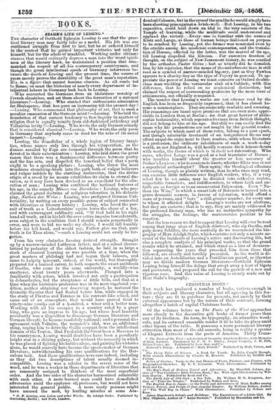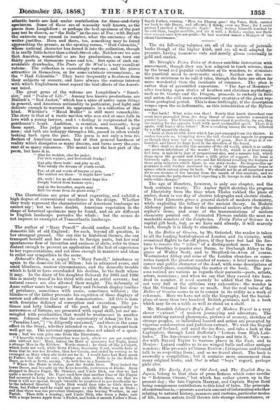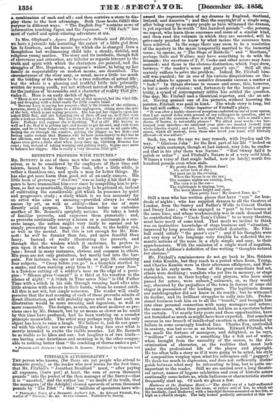CHRISTMAS 1300KS.
THE week has produced a number of books, various enough in their subjects and literary character, but all agreeing in this fea- ture; they are fit to purchase for presents, not merely by their external appearance but by the nature of their contents, forming altogether a batch of capital Christmas books.
Of the volumes before us The Poets of the West approaches more closely to the decorative gift books of former years than any of its brethren. Its form, its typography, its attractive wood-
cuts, and its outward ensemble render it fit to take its place amid other bijoux of the table. It possesses a more permanent literary attraction than most of the old annuals, being in reality a species of Elegant Extracts from the poets of America. Thirty Trans-
* The Poets of the West : a Selection of favourite American Poems, with Memoirs of their Authors. Illustrated by F. 0, C. Harley, Jasper Cropsey, .T. II. Hill, Birket Foster, &c. Published by Low, Son, and Co.
_Deborah's Diary. A Sequel to " Mary Powell." Published by Hall, Virtue, and Co. The Fairy Tales of Science. A Book for Youth. By John Cargill Brough. With sixteen Illustrations by Charles H. Bennett. Published by Griffith and Ferran. Relics of Genius: Thits to the last Homes of Poets. Painters, and Players, with Biographical Sketches. By T. P. Grinsted. With Illustrations. Published by Kent and Co.
The Boy's Book of Modern Travel and Adrcnture. By Meredith Janes, Au- thor of "The Children's Bible Picture Book," &c. With eight Illustrations by Wil- liam Harvey. Published by Kent and Co.
The -Early Life of Old Jack : a Sea Tale. By William H. G. Kingston, Au- thor of' Peter the Whaler." Published by Nelson and Sons.
The _English Boy in Japan ; or the Perils and Adventures of Mark Raffles among Princes, Priests, and People of that singular Empire. By William Dalton, Author of "The Wolf Boy in China." With Illustrations. Published by Nelson and Sons. Agnes Hopetoun's Schools and Holidays. The Experiences of a Little Girl. BY ldra. Oliphant, Author of " Katie Stewart." Published by Macmillan and Co. atlantic ar raw laid I under 1 'contribution for. three-mad-forty ,:),SOnte l of ,these are of necessity :known, as the pieces, from Longfellow; or perhaps the best specimen of the poet may not he chosen, as "the Bells' in the case of Poe ; with Bryant the:extracts may exceel in!number7 what.theeniinelice of the writerjustifies. Here and there, too, sotheihing may be found approaching the prosaic, as-the opening verses,. "Ifail,Oolumbiay" whose- national character has forced itinto theleollection, though it is really little better than aGrub Streetode. Neither are we sure that America, wonderful as are- her productions, can turn out thirty poets in threescore years iand ten. -.Rat spite of such-un- avoidable drawbadks, The Poets of' the irestis a very excellent volume. The collection is exceedingly various ; and. the pieces attractive -in themselves, or for someextrinsio circumstance, as the "Hail' Columbia." They have -frequently a freshness from their subjects or scenery, and have always the turious interest with which Englishmen must regard the best efforts of the Ameri- can mind.
_The, great gems of the volume . are -Longfellow's " Excel- sior " and "Psalm of Life." Among less known productions are Halleck's " Red Jacket," which has a spice of satire upon things in. general, and Amcsican nationality in particular, just light and delicate enough to warrant its appearance in a collection of this kind. Whittier's "Maud Muller" is still more remarkable. The story is that of a rustic ma;den who sees and. at once falls in love with a young lawyer, and t. feeling is reciprocated in the gentleman's heart. .Amgition, et 'Tendon, and necessity, keep them apart., The judge marries a rich woman, Maud a poor man; and both are unhappy through a life, passed in often vainly looking back upon the past. The poem is not only a true re- fection of American manners, but of that general hardness of reality which dissipates so' manydreams, and turns awry the cur- rant of so many romances. The moral is not the best part of the poen', but here it is.
"Alas for maiden, alas for judge, For rich repiner, and household drudge ! God pity them both: and pity us all, 'Who vainly the dreams of youth recall. For, of all sad words of tongue or pen, The saddest are these : 'it might have been!'
Ah, well ! for us all some sweet hope lies Deeply buried from human eyes ; And in the hereafter, angels may Roll the stone from its grave away !"
The illustrations are gems of wood engraving, and exhibit a high degree of conventional excellence in the design. Whether they truly represent the characteristics of American landscape we cannot say ; but we have doubts. American vegetation in the shape of botanical specimens may be found, and an air different to English landscape pervades the whole ; but the scenes do not impress as examples of Transatlantic landscape.
The author of "Mary Powell" should confine herself to the domestic life of old England; for such, beyond all question, is her strongest ground. She can rise to historical themes, she can transport herself and her readers to foreign parts, but her real spontaneous flow of invention and easiness of style, refer to times distant enough to prevent an application of the test of experience to her representations, and yet close enough in manners and ideas to enlist our sympathies in the scene. Deborah's Diary, a sequel to "Mary Powell," introduces us again to the domestic life of Milton ; but in advanced years, and amid blindness, narrow circumstances, and the domestic trouble which is held to have overshaded his decline, be the fault whose it may. In the diary of his daughter Deborah for 1665 and 1666 this is mainly traced to his third wife and an artful servant ; but natural causes are also allowed their weight. The deformity of Anne rather sours her temper ; Mary and Deborah display. touches of petulance, sometimes with cause, sometimes without ; the blindness of the father prevents his cognition of those displays of sorrow and affection that are not demonstrative. All this is done with feminine delicacy of conception and execution. The pa- tience and lofty kindness of the poet, and his superiority to narrowness of fortune, are presented with equal skill, yet not un- mingled with peculiarities that would be weaknesses in another man. Johnson observes that the superiority of Adam [to Eve in "Paradise Lost,"] "is diligently sustained, and there is the same effect in the Diary, whether intended or no. It is a pleasant book well got up. The external appearance does not admit of a speci- men; but we can give one from the literature.
"I heartilie wish our Stepmother were back, albeit we are soe comfort- able without her ! Mary, taking the Maid at unawares last Night, found a strange Man in the Kitchen.• Words ensued; he slunk off like a Culprit, which lookt not well, while Betty Fisher, brazening it out, woulde have at finite that he was her Brother, then her Cousin, and ended by vowing to be revenged on Mary when she lookt not for it. I would have had Mary speak tO Father, but she will not ; perhaps see best. Polly is in the Sulks to Daye as well as Betty, saying, As well live in a Nunnerie.' "When the Horse is stolen, shut the Stable Door. Mary locked the lower Doors, and brought up the Keys herselfe, yestereven at Duske. Anon dropped in Doctor Paget, Mr. Skinner, and Uncle Dick, see that we had Ruite a merrie Party. Dr. Paget sayd how that another Case of the Plague had occurred in Long Acre; howbeit, this onlie makes three, see that we trust it will not spread, though 'twoulde be unadvised to goe needlesslie in- to the infected Quarter. Uncle Dick would fayn take us Girls down to Oxon, but Father sayd he could not spare us while Mother was at Stoke, and that there was noe prevalent Distemper, this bracing Weather, in our Parish. Then felle a musing; and Uncle Dick, who loves a Jests, outs with a large brown Apple from 's Pocket, and holds it aneath Father's Nose. Sayth Father, rousing, How far ,Panay gees! thy Voice, Dick, carried me back to olde Dayes, andvirdbeted,1 X 114f4,1 even my Nose ; for I could protest I smelled a Sheepseote Apple.' And, feeling himself° touched by its cold Skin, taught merrilie and ate it with a Relish; saving, floe Sorte ever seemed unto him see goOde—he had remised rainie a llamper of 'em
about Christmasse." •
The six 'following volumes are all of the nature of Juvenile books though of the higher kind, and are all well adapted tar presents, having numerous cuts and mostly, gleam ex.ternally4 gold. And scarlet.
Mr. Brough's Fury Tales of Science -combine instruction with amusement, though they are less adapted to dank science, than by the broad and popular exhibition of its wonders, to stimulate the youthful mind to systematic study. Neither are the eon- tents in strictness to be "called tales, though thefacts are often far more wonderful than the incidents of. romance. The plan is rather that -of personified exposition: "The Age of Monsters" after touchino° upon stories of heathen and christian mythology, such as St. George and the Dragon, proceeds to embody in form and action the still more extraordinary creatures of the great rep- tilian geological period. This is done strikingly, if the description verges upon the melodramatic, as this introduction of the Hylteoh. swum.
" But hark ! What liaise was that? Surely that harsh discordant roar roust have proceeded from the deep throat of some monster ooneealed in yonder forest. The Crocodiles seem to understand it perfectly, for see, they are making for the opposite bank with most undigaified speed. There it is again, still louder than before! Now a crashing among the trees, followed by a wild unearthly shriek.
"Look at that terrible form which has just emergedflosn the thicket. It rushes towards us, trampling clown the tall shrubs that impede its progress as though they wore but so many blades of grass. Now it stops as if ex- hausted, and turns its huce head in the direction of the forest. "Row shall we describe this monster of the old world, which is so unlike any modern inhabitant of the woods ? Its body, which is at least twenty feet long, is upheld by legs of proportional size, and a massive tail, which drags upon the ground and forms a fifth pillar of support. Its head is hideously ugly, its immense jaws and fiat forehead recalling the features of those grim monsters which figure in our story-books. Its dragon-like ap- pearance is still further increased by a ridge of large triangular bones or spines which extend along its back. We should not be at all surprised were we to see streams of fire issuing from the mouth of this creature, and we look towards the palm-forest half expecting a St. George to ride forth on his milk-white charger."
The age of Monsters, however, is only one chapter, and the book contains twenty. The Amber Spirit sketches the progress of Electricity from the time when Tholes rubbed the piece of amber, down to our day of electric telegraphs and electric clocks. The Four Elements gives a general sketch of modern chemistry, while exploding the fallacy of the ancient theory. In Modern Alchemy justice is done to the mediwyal seekers after the philo- sopher's stone, and some of the transmutations of modern chemistry pointed out. Animated Flowers unfolds the most re- markable wonders of the Zoophytes. Fairy Tales of Science is a capital gift book, but, as we have said already, it will scarcely teach, though it is likely to stimulate.
In the Belies of Genius, by Mr. Grinsted, the reader is taken to all the leading burial-places of London and its vicinity, with occasional flights to far-off places, if they have but had the for- tune to receive the " relics' of a distinguished man. Thus we go to Dumfries to ponder over Burns, to Dryburgh Abbey to the grave of Walter Scott, and to Stratford-on-Avon of course. Westminster Abbey and some of the London churches or ceme- teries furnish the greatest number of names ; a brief notice of the career and public character of the dead, with some descriptions of the burial-place, constituting the matter of the book. The per- sons noticed are various as regards their pursuits—poets, artists, actors, musicians ; and when we say that they exceed two hun- dred in number, it need scarcely be added that the lives are not very full or the criticism very exhaustive: the wonder is that Mr. Grinsted has done so much. But the real value of the Belies of Genius seems to us to consist in its utility as a work of reference. Here we have not only the biography, but the burial- place of more than two hundred British geniuses, and in a book which may lie on a table as well as stand on a shelf.
Mr. Meredith Johnes's Boy's Book of Modern Travel is a very clever "extract" of modern journeying and adventure. The most striking natural phenomena, pictures of scenery, sketches of strange peoples, or individual hazard and action are presented by vigorous condensation and judicious extract. We visit the Geyser springs of Iceland, sail amid the ice floes and take a look at the Laplanders, through Lord Duiferin's "Letters from High Lati- tudes." The Americans carry us to Japan and into it. We wan- der with Bayard Taylor to various places in the East, and to Mexico ; Layard enables us to see winged bulls and other antique wonders; Hue presents a Chinese Review; Livingstone and Gerard talk to us respecting lions; and so we travel about. The book is avowedly a compilation ; but it contains more amusement than many original books, and that is what "boys" regard, perhaps girls also.
Both The Early Life of Old Jack, and The English Boy in Japan, belong to that class of prose fictions which some ascribe to "Robinson Crusoe," but which has rather grown up in the present day ; the late Captain Marryat, and Captain Mayne Reid being conspicuous contributors to this kind of tales. The principle of construction is,—procure a certain amount of information whether relating to natural history, manners and customs, particular modes of life, human nature itself thrown into strange circumstances, or a combination of each and all; and then contrive a 'story to die.: play -them to the best advantage. Both these books fulfill this purpose in different ways. " The English Boy" Contains more of information touching Japan and the Japanese. " Jack " has moat of varied and spirit-stirring adventure at sea.
In Mrs. Oliphant's Agnes Hopeloun's Schools and Halidaya, we have a juvenile tale narrating the career of a little girl from ton to fourteen,. and the means by which she is changed from a thoughtless but wellmetwing ehild into a steady, dutiful, and religious young maiden. The story and its incidents, though full of cleverness and attraction, are inferior as regards interest to the truth and spirit with which the characters are painted, and the struggles of Mrs. Hopetoun, a surgeon's widow, to brill,- up her family in respectability on modest means, are desorib:d. The circumstances of the story may, as usual, move a little too trubh at the bidding of the writer to' be a true reflection of actual life; but the whole is a pleasing and truthful little tale' prim iy written for young youth, yet not without interest to older' for the justness of its remarks and a character of reality that'0,i•- vades it. Here is an early sketch of Agnes. "There is not a Bound in the room just at this moment, but the wind lift- ing and dropping with a faint rustle Ilae little muslin blind. "Because Lacy is saying her prayers--that is the reason of the stillness ; however, there is a little figure in a white nightgown, sitting ,tipon the side of the bed, which is not saying p: ..t She has put her slipperkupcm her naked little feet, and 'sits 'balancing one of then' 111* and on, as if Nat were quite a serious occupation. She has bren doing so for about a quartet' of an hour. Perhaps you suppose she is thinking. Ni at all! She knows, as well as I do, that it is getting late, and means to get dressed, and rush down stairs and be so busy today--only somehow it is pleasant to sit quite idle, feeling the air through the window, poising tho slipper on her .foot—and feeling quite certain that Mamma will be here immediately' to find her in her idleness, and that very likely she will get the scolding he deserves. Agnes even gives a little start when Lucy rises up,. thinking Manuna has come ; but, Instead of taking warning and getting ready, be,dus once more to balance her slipper. She is really a very tiresome little girl." ,




























 Previous page
Previous page